인공지능 시대가 개화하며 기존 컴퓨터비전 기술이 빠르게 발전해 시장 영역을 크게 확대하고 있다. 각광받는 기술인 만큼 국내 컴퓨터비전학회 관심도도 높아져 올해 역대 최대 참여도를 기록하며 학술대회장이 참관객들로 북적였다.
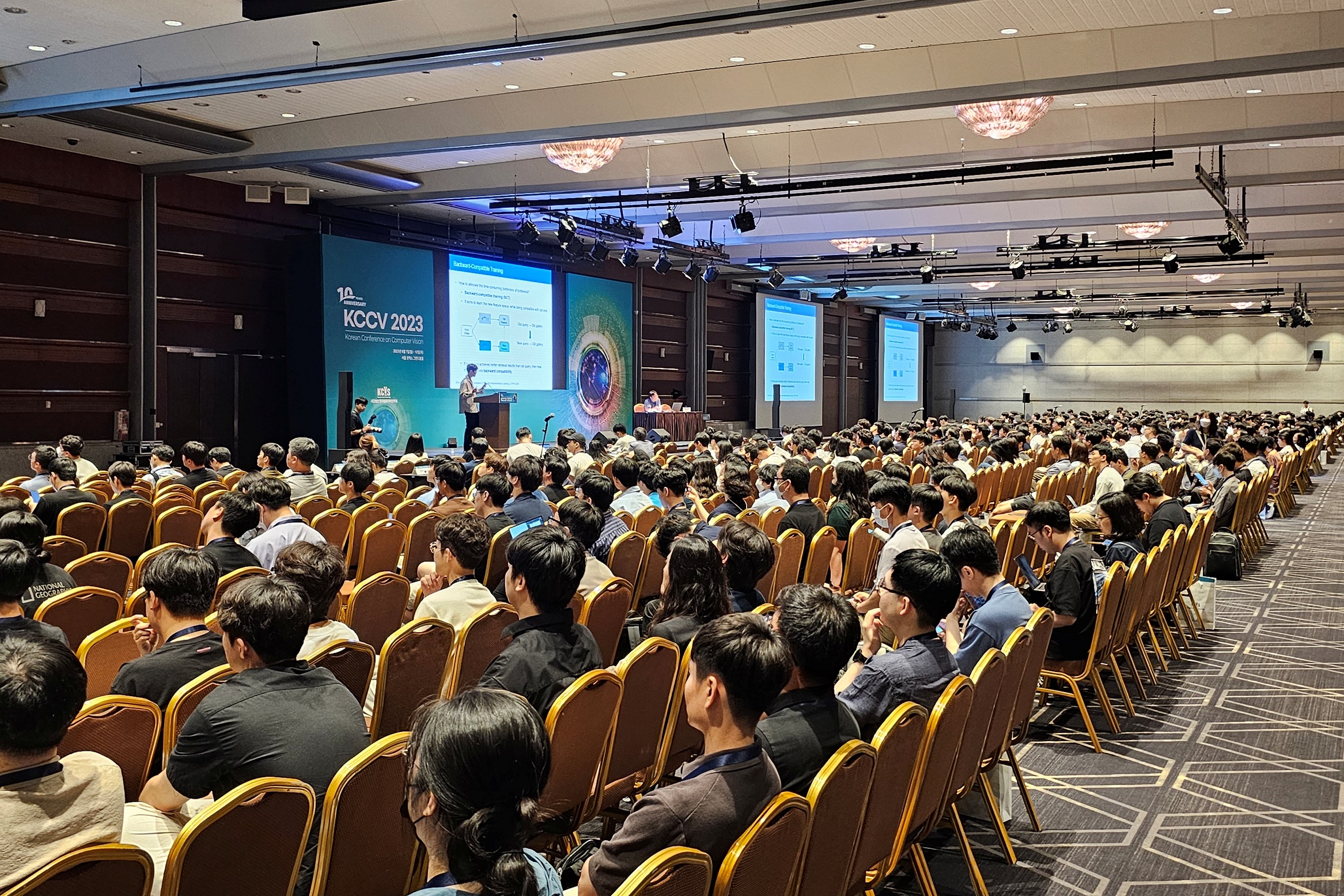
▲ KCCV2023(Korean Conference on Computer Vision 2023)
제10회 KCCV 개최, 국내 비전 연구↑급속 성장 中
국내외 발표 컴퓨터비전 연구 한자리, 기업세션도 多
인공지능 시대가 개화하며 기존 컴퓨터비전 기술이 빠르게 발전해 시장 영역을 크게 확대하고 있다. 각광받는 기술인 만큼 국내 컴퓨터비전학회 관심도도 높아져 올해 역대 최대 참여도를 기록하며 학술대회장이 참관객들로 북적였다.
한국컴퓨터비전학회가 KCCV 2023(Korean Conference on Computer Vision 2023)을 서울 삼성동 코엑스 그랜드볼룸에서 7일 개최했다.
올해 10회차를 맞이하는 KCCV는 첫 회를 개최한 2014년과 비교하면 괄목할 발전을 이룩했다. 현재는 CVPR, ECCV 등 대상으로 하는 세계 최고 학회에서 발표된 한국 논문이 300여 편에 이르렀으며, KCCV도 이러한 국내 비전 연구 발전에 힘입어 그 규모도 함께 성장하고 있다.
사전등록자 수도 1,100여 명에 후원기업 수가 20개 사에 이르며 역대 최대 기록을 경신했다. △퀄컴 △포스코 DX △카카오브레인 △한국전자기술연구원 △한국과학기술연구원 등 다양한 산업체와 연구기관들이 참여한 이번 행사는 △ECCV 2022 △NeurIPS 2022 △CVPR 2023 등 컴퓨터비전 분야 세계 유명 학술대회서 발표된 논문들로 세션이 꾸려졌다.
메인 컨퍼런스와 워크숍 및 튜토리얼로 구성된 KCCV 2023은 나흘 간 진행되며 △구두 발표 △ Doctoral Colloquium △기업 발표 △포스터 및 데모 세션 △초청 강연 △패널 토론 등으로 구성됐으며, 마지막날 워크숍과 프로그래밍 실습 튜토리얼을 통해 최신 논문을 직접 실습해볼 수 있는 기회가 제공된다.
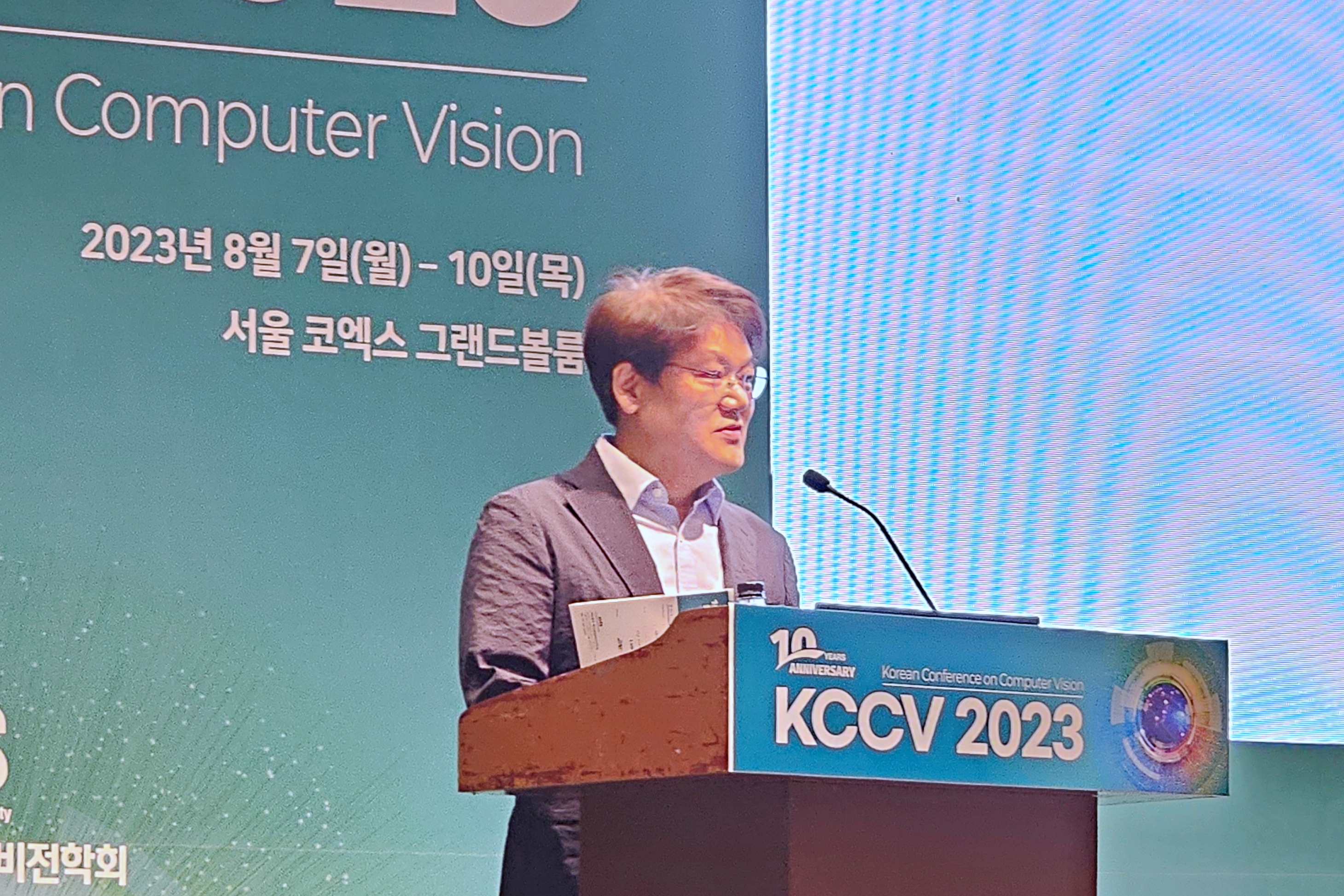
▲이준호 한국컴퓨터비전학회 회장이 축사를 하고 있는 모습
첫날 발표에선 △조성현 포항공과대 교수의 Realistic Blur Synthesis for Learning Image Deblurring △진경환 대구경북과학기술원 교수의 B-Spline Texture Coefficients Estimator for Screen Content Image Super-Resolution △김상필 고려대 교수의 Sound-guided Semantic Video Generation 등의 논문이 발표됐다.
이 중 조성현 교수의 발표는 유럽컴퓨터비전학회(ECCV) 2022에서 발표된 연구로, 기존 디블러링 기법들의 학습에 사용되는 가상 블러 데이터 세트를 좀더 사실적인 데이터 세트로 개선하는 연구를 진행했다.
영상을 선명하게 보정해주는 데는 객체의 모션 블러 현상을 제거하는 기술이 필요하다. 이러한 디블러링 기술은 다양한 애플리케이션에서 채택하고 있으며, 기능의 고도화를 위해선 학습 데이터 세트 확보가 필요하다.
기존 기법은 블러 데이터 세트를 구하기 어렵다는 한계로 합성 데이터 세트를 만들어 학습에 투입하는데, 합성 데이터 간 서로 동일하거나 유사한 ‘상동성’ 한계로 인해 더 사실적인 합성 데이터 세트 확보가 필요했는데 조 교수는 이러한 문제를 개선하기 위한 연구를 진행한 것이다.
진경환 교수는 CVPR2023에서 발표한 바 있는 연구로, 카메라로 촬영한 이미지와 디스플레이 간에 서로 다른 해상도 차이를 매칭하는 새로운 알고리즘을 제시했다. 김상필 교수는 CVPR2022에서 발표한 논문을 확장해 음성 기반 영상 생성 모델이란 진전된 연구 결과를 발표했다.
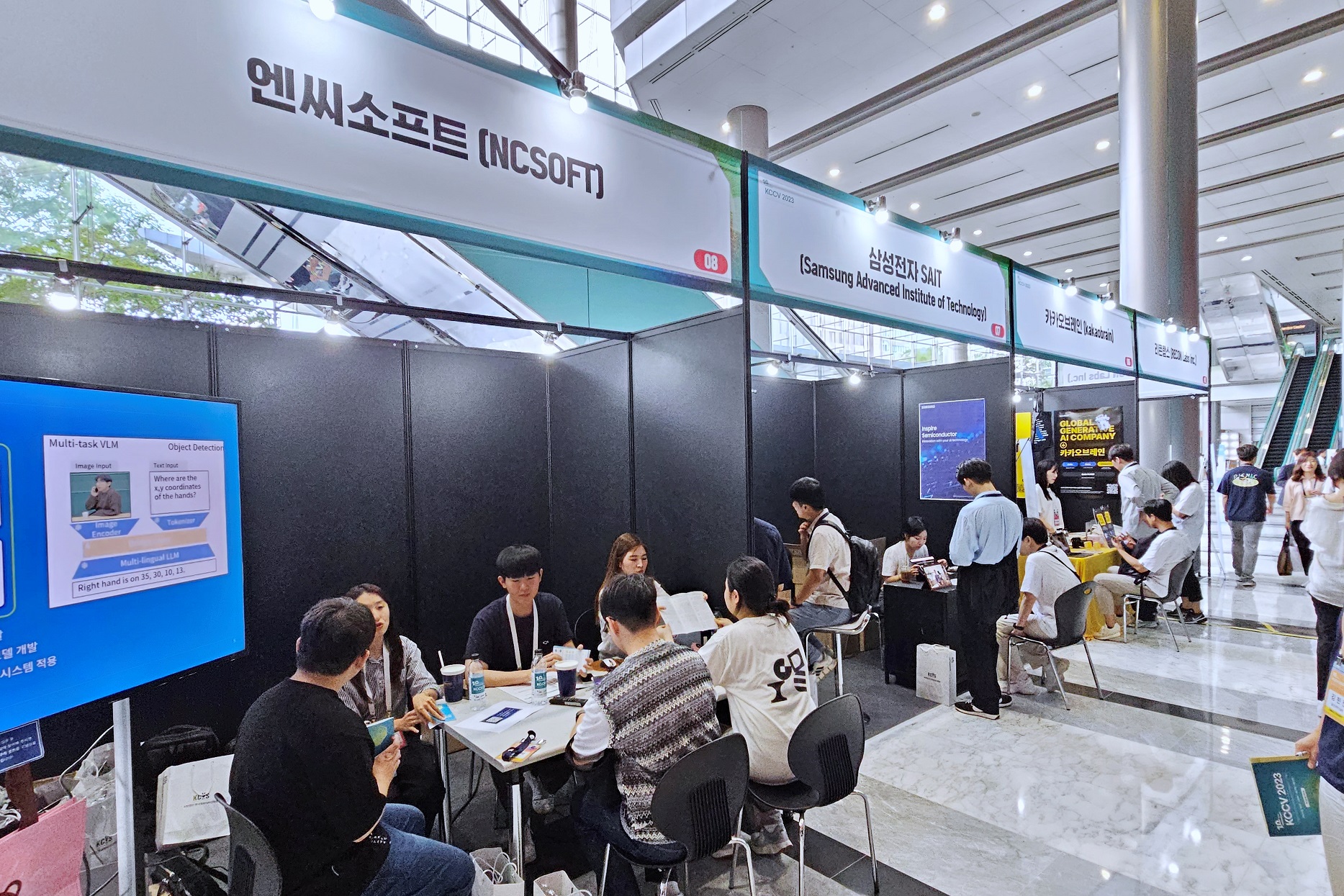
▲KCCV2023 전시 부스서 진행된 AI 인재 채용 상담회
이외에도 기업 세션에는 △퀄컴 △포스코DX △리콘랩스 등이 나와 산업 현장에서 연구되는 기술과 시장에 선보이고 있는 최신 제품들을 소개했다. 포스코DX는 제조 현장에서 활용되는 컴퓨터비전 기술과 사례들을 설명했으며, 퀄컴은 자사 자율주행 플랫폼인 스냅드래곤 라이드 플랫폼에 대해서 소개했다.
리콘랩스는 2D 사진·이미지·영상 속 피사체 등을 3D로 모델링하는 SaaS 서비스 3Dpresso를 소개했다. 윤경원 리콘랩스 CTO는 “AI 모델마다의 요구사항이 다르고 대응방법도 다르며, 시장·기술 등의 업데이트가 너무 빨라 논문 따라가기도 버거울 수 있다”고 말해 빠르게 변화하는 시장에 대응하는 개발 일선에서의 ‘타임 투 마켓(Time to Market)’을 강조했다.
이준호 한국컴퓨터비전학회 회장은 “KCCV 행사를 통해 우수한 연구자들이 세계 최고 수준의 연구 결과와 연구 방법을 전파하며 국내 컴퓨터비전 분야 발전에 일조했다”고 자부했다. 더불어 “KCCV가 컴퓨터비전 분야 국내 산학연 연구자들이 긴밀히 소통하고 활발히 토론하는 장이 되길 바란다”고 밝혔다.
최종현 KCCV2023 프로그램위원장(연세대 교수)은 “KCCV에 발표되는 연구들이 이제는 세계적 학회에서 테스트 오브 타임 어워드, 아웃스탠딩 페이퍼 어워드 등 다양한 수상 실적을 기록하며 질적 발전이 동반되고 있다”며 “산업과 시장에 컴퓨터비전 기술 수요 증가에 따라 컴퓨터비전학회의 주목도와 위상이 함께 높아지고 있다”고 덧붙였다.
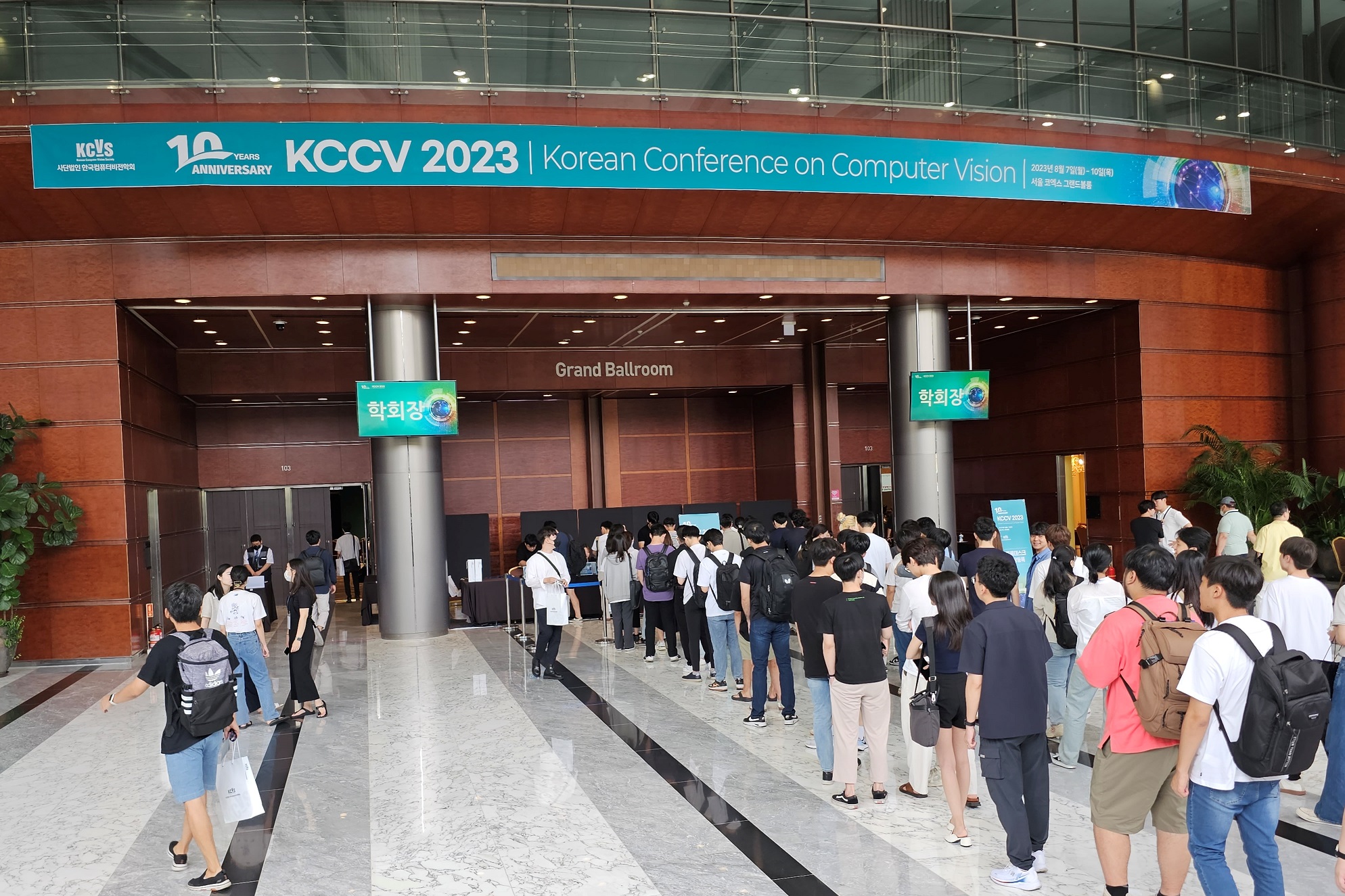
▲KCCV 2023에 참석하기 위해 길게 줄을 선 참관객들의 모습
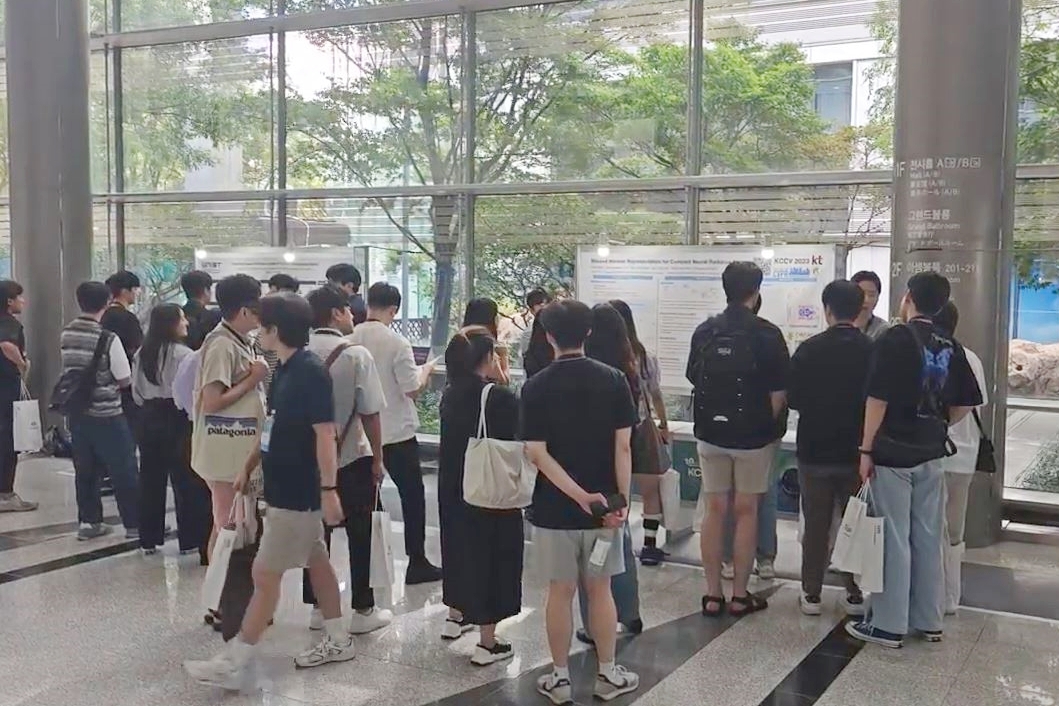
▲포스터 세션



